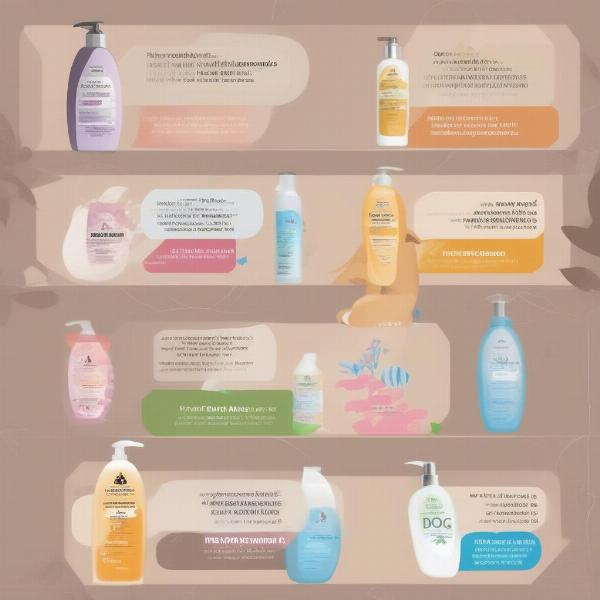Antifungal shampoo for dogs is a specialized product designed to treat fungal skin infections, a common problem in our canine companions. These infections can cause itching, hair loss, and skin irritation, impacting your dog’s comfort and overall health. Choosing the right antifungal shampoo and understanding its proper use is crucial for effective treatment and prevention. This guide will equip you with the knowledge you need to navigate the world of antifungal shampoos for dogs, ensuring your furry friend receives the best possible care.
Understanding Fungal Infections in Dogs
Fungal infections, also known as dermatophytosis or ringworm, are caused by microscopic fungi that thrive in warm, humid environments. These infections can affect dogs of all ages and breeds. Recognizing the signs of a fungal infection is the first step towards proper treatment. Common symptoms include circular patches of hair loss, redness, scaling, and intense itching. If you suspect your dog has a fungal infection, it’s crucial to consult a veterinarian for an accurate diagnosis and treatment plan.
Choosing the Right Antifungal Shampoo for Your Dog
Selecting the appropriate antifungal shampoo can be overwhelming with the variety available. Key ingredients to look for include ketoconazole, miconazole, and chlorhexidine, all known for their antifungal properties.  Various antifungal dog shampoos Your veterinarian can recommend the best option based on your dog’s specific needs, considering factors like the severity of the infection, their age, and overall health.
Various antifungal dog shampoos Your veterinarian can recommend the best option based on your dog’s specific needs, considering factors like the severity of the infection, their age, and overall health.
How to Use Antifungal Shampoo for Dogs
Using antifungal shampoo effectively involves more than just lathering and rinsing. Follow these steps for optimal results:
- Wet your dog’s coat thoroughly with lukewarm water.
- Apply the prescribed amount of antifungal shampoo, ensuring even coverage over the affected areas and beyond.
- Gently massage the shampoo into the skin, creating a rich lather.
- Allow the shampoo to sit on the skin for the duration recommended by your veterinarian or the product instructions, usually 5-10 minutes.
- Rinse thoroughly, ensuring no shampoo residue remains.
- Dry your dog’s coat completely.
Remember to wear gloves during the bathing process to avoid potential transmission of the fungal infection.
Preventing Fungal Infections in Dogs
Preventing fungal infections is often easier than treating them. Maintaining a clean and dry environment for your dog is crucial. Regularly disinfecting bedding, toys, and grooming tools can significantly reduce the risk of infection. A healthy diet and regular grooming can also boost your dog’s immune system and improve skin health, making them less susceptible to fungal infections.
Conclusion
Antifungal shampoo for dogs is a valuable tool in combating fungal skin infections. By understanding the causes, symptoms, and treatment options, you can help your furry friend stay healthy and comfortable. Always consult your veterinarian for an accurate diagnosis and personalized treatment plan. Regular grooming, a healthy diet, and a clean environment can help prevent future infections, ensuring your dog’s skin stays healthy and vibrant.
FAQ
- How often should I use antifungal shampoo on my dog? Follow your veterinarian’s instructions regarding frequency, as it varies depending on the severity of the infection and the specific shampoo used.
- Can I use human antifungal shampoo on my dog? No, human antifungal shampoos are formulated for human skin and can be harmful to dogs. Always use a veterinary-approved product.
- How long does it take for antifungal shampoo to work? Improvement can be seen within a few weeks, but complete resolution may take several months.
- What if my dog licks the antifungal shampoo? Contact your veterinarian immediately if your dog ingests a significant amount of the shampoo.
- Are there any side effects of antifungal shampoo for dogs? Some dogs may experience mild skin irritation or dryness. Consult your veterinarian if you notice any adverse reactions.
- Can I prevent fungal infections in my dog completely? While complete prevention is difficult, maintaining a clean environment and a healthy lifestyle can significantly reduce the risk.
- What other treatments are available for fungal infections in dogs? Your veterinarian may prescribe oral antifungal medications or topical creams in addition to shampoo therapy.
Related Articles:
About ILM Dog:
ILM Dog provides expert advice on all aspects of dog care, from breed selection and health to training, nutrition, grooming, and accessories. We offer practical, reliable information to dog owners worldwide, empowering them to provide the best possible care for their canine companions. Whether you’re a new dog owner or a seasoned expert, ILM Dog is your trusted resource for all things dog-related. Contact us at [email protected] or +44 20-3965-8624 for personalized advice.